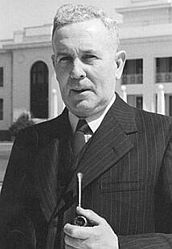

|
Pushing the Boundaries:
Facilitation Frontiers
Charles Sturt University, Bathurst - New South Wales, Australia 26-28 November 2008
|
| Program
|
| Registration |
| Location
& Venue |
| FAQs |
| Health
& Sustainability |
| Sponsors & Exhibitors |
| Organising
Team |
| Key Contacts
|
| AFN 2008 Conference |
| AFN Home |
Our Conference venue, Charles Sturt University hosts an annual event - the Ben Chifley 'Light on the Hill' Address - to coincide with the birthday of former Prime Minister, Ben Chifley at which prominent public speakers talk about the aspiration and rights of working class people to make a better life for themselves and their families.
This is an unusual tribute to a man of humble beginnings and modest ambition who became one of the most highly regarded of Australia’s Prime Ministers. Chifley certainly pushed the boundaries as a most unlikely candidate to attain the nation's highest elected office.

From engine driver to Prime Minister
Ben (Joseph Benedict) Chifley was born in a working man's cottage in Bathurst in 1885, the son of a blacksmith. At the age of five he was separated from his parents and lived in a slab hut on a farm with his aged Irish emigrant grandfather, who subsequently lost all his savings in the bank crash of 1892.
Chifley spent his formative years engaged in farm chores and occasionally receiving a smattering of education at the local village school. He set about remedying his lack of formal education by attending evening classes up to four nights a week at the Workers Educational Association and Bathurst Technical School. He joined the railways in 1903 at the age of 17 as a shop boy, and worked his way up to become a fully qualified engine driver at the age of 27. Along the way he developed a keen interest in finance and economics.
He was first elected to Parliament in 1928, with a record majority. The following year a Labor government under Scullin won office and Chifley was to serve as Minister for Defence and Territories. After losing his seat in 1931, during the Great Depression, he survived on his wife's family's money and his part-ownership of the Bathurst newspaper the National Advocate.
Re-elected in 1940, Chifley served as treasurer in the Curtin Labor government and played an important role in financing the war effort. After John Curtin died in office in July 1945, he became Australia's 16th Prime Minister and also held the Treasurer portfolio.
Chifley was responsible for national projects such as the ambitious Snowy Mountains hydro-electric scheme and the assisted immigration program. He also enacted legislation that enabled the Federal Government to have more control over the economy.
Closer to the people, Chifley was strongly driven by a vision of a fair and just society. He introduced a widows’ pension, sickness and unemployment benefits, increased invalid and old age pensions and set the stage for comprehensive social welfare policies.
The Light on the Hill
Amid many difficulties and disappointments in 1949, Chifley made a significant speech to the NSW Branch of the Labor Party, which became known as his ‘Light on the Hill’ speech.
Here is an extract: I try to think of the Labour movement, not as putting an extra sixpence into somebody's pocket, or making somebody Prime Minister or Premier, but as a movement bringing something better to the people, better standards of living, greater happiness to the mass of the people. We have a great objective—the light on the hill—which we aim to reach by working for the betterment of mankind not only here but anywhere we may give a helping hand. If it were not for that, the Labour movement would not be worth fighting for.If the movement can make someone more comfortable, give to some father or mother a greater feeling of security for their children, a feeling that if a depression comes there will be work, that the government is striving its hardest to do its best, then the Labour movement will be completely justified.
It does not matter about persons like me who have our limitations. I only hope that the generosity, kindliness and friendliness shown to me by thousands of my colleagues in the Labour movement will continue to be given to the movement and add zest to its work.
Chifley bows out
Chifley lost office at the 1949 federal election, after an attempt to nationalise the banks, and amid anti-Communist hysteria. In Opposition, he was a formidable opponent for Prime Minister Menzies who was trying to ban the Communist Party. This was a major issue at the election of April 1951, and Labor was again defeated. Shortly afterwards, Chifley died of a heart attack in his room at the Kurrajong Hotel in Canberra, where he had lived throughout his Prime Ministership, having refused to move into the official residence at The Lodge.
Menzies heard of Chifley's passing while attending an official function at the Albert Hall in Canberra to mark fifty years of Australian Federation. Renowned for being impassive, Meanzies is said to have fought back tears, ordering that the function be terminated as a mark of respect to his predecessor and political adversary.
For additional background see:
http://chifley.org.au/about/lightonhill.php
http://workers.labor.net.au/17/c_historicalfeature_chifley.html